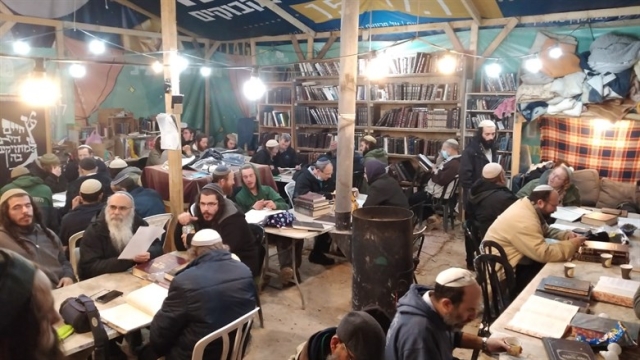A longstanding policy in effect since 2005 might be reversed under Israel's new nationalistic government, and the prospect is causing much joy in many Israeli homes. The Israeli withdrawal from Northern Samaria and Gaza in 2005, was a traumatic event for many Israelis who were forced out of their homes under Prime Minister Ariel Sharon’s unilateral orders. Ever since, any Israeli group that has tried to build new communities in parts of Area C, the area administered by Israel under an agreement with the Palestinian Authority under the Oslo Accords, has been deemed illegal by the state and removed by force using the Israel Defense Forces.
Now that the new coalition is in power, the entire policy may change as many Knesset Members are seeking to permit the renewed settlement of those areas evacuated in 2005. Many lawmakers and citizens see the voluntary withdrawal as a failure that has accomplished nothing positive, and increased terror and missile attacks on Israeli civilians.
Israel plans to advance the legalization of the Homesh yeshiva in Area C of the West Bank in a move seen as a first step toward rebuilding four northern Samaria settlements evacuated in 2005.
— The Jerusalem Post (@Jerusalem_Post) January 2, 2023
By @tovahlazaroff | #Israelhttps://t.co/JbVDyDx8Yz
Under international law, the area was viewed as Jordanian territory, but 22 years after Israel's 1967 six-day war victory which saw the Jordanian forces retreat to Jordan, The Hashemite Kingdom formally renounced claims to the area and revoked Jordanian citizenship of all who lived in the region. Israel had a rightful claim to the area after that, however, decided instead to try to help the Palestinian population realize their dreams of statehood by offering them land in exchange for peace.
Amid the current government's attempts to change the policy, Israeli Supreme Court justices President Ester Hayut, Vice President Uzi Fogelman, and Yael Wilner issued an interim injunction, ordering the state to provide within 90 days an official opinion on why the Jewish presence in the currently classified illegal Northern Samaria settlement of Homesh should not be evicted.
Israel does not "occupy" Judaea and Samaria, but China occupies and represses Tibet and Turkey likewise Northern Cyprus. The so-called West Bank was illegally occupied by Jordan from 1948 to 1967and the current issue is to resolve this situation. https://t.co/mw8ZExU5Fa
— Raymond Cannon (@RayCannon54) January 3, 2023
If the coalition’s opinion is accepted by Israel’s Supreme Court, it can be seen as the legal premise for the resettling of the entire Northern Samaria. The Justice's statement read “The political echelon wishes to inform the court of its intention to act as soon as possible to change the legal provisions concerning the prohibition of Israelis living in northern Samaria. It is the intention of the legislative branch to work towards a full legal regulation of Torah learning in the area of the Chumash settlement in order for it to be in accordance with all laws. Naturally, the change in the legal situation is expected to bring with it a change in the local enforcement policy. However, formulating the enforcement policy requires additional time."
The head of the Samaria Council, Yossi Dagan, one of the leaders of the struggle for Northern Samaria, and himself an evacuee from the region in 2005, responded to the court’s decision. "The judges of the High Court of Justice laid out the issues clearly in front of Prime Minister Benjamin Netanyahu and all the ministers of the government. This is the government's first test, and the government must not fail it.”
Shabbat Shalom from Israelite city of Shiloh located in territory of Tribe of Ephraim in Samaria in the southern part of the northern Kingdom of Israel. Shiloh was the major Israelite worship center for 369 years before the first Temple was built in Jerusalem by King Solomon. pic.twitter.com/qD7waBF2Oz
— Joshua Robbin Marks (@JoshMarks78) September 4, 2020
Dagan further added, “They must state clearly - the withdrawal [of communities that were decades old] was an injustice, the deportation [of Israeli citizens from their homes] was a mistake. The area of the displaced communities in Northern Samaria is Area C, an area under the full control of the State of Israel, the IDF is there most of the time; there is no claim that much of the land is private land, there is no reason not to cancel the secession law and to regulate the Homesh yeshiva [and community] immediately, this is the straightforward thing that the government must do, and we will insist that follows through."


